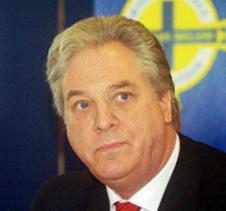Thierry Henry’s “handled” assist in the recent match against the Republic of Ireland, which led to an “illicit” equaliser raises again the issue about the use of technology in football.
I spent four years recently, whilst chief executive of the Irish Football Association, as a member of the International Football Association Board, which is made up from FIFA and the four Home Country Associations, and which determines the Laws of the Game. There has not been great evidence of the Home Countries speaking as one at those meetings.
Those years were spent in assessing goal line technology and focused on a “chip in the ball” approach involving a company called Cairos, partnered by adidas and the “hawkeye” type approach based on video technology, advocated by the Premier League.
Both were put on hold in 2008, in favour of an idea mooted by UEFA, that would see the introduction of two extra linesmen, operating behind the goal lines. That is now part of a wider experiment, but in a world where many Associations struggle to find three, or four officials, it is unlikely to gain wholesale support, as the only solution.
FIFA’s concern has always been that “the beautiful game” should be free-flowing and any technology should be applied in “real time” to avoid stoppages. Their concern too, is that what is applied at the very top levels of the game should be available at the lower levels. This, of course, is neither practicable, nor relevant.
Few sports at the highest level have such a worldwide exposure through television of incidents on which a match turns. The Cairos experiment provided for a message, a “beep”, in the referee’s watch to indicate immediately that the call had crossed the line for a goal. It would not have picked up handling incidents such as the Henry incident.
FIFA’s concern that the game should not be interrupted by technology is also irrelevant, given that most matches over-run by four of five minutes, to cater for substitutions, injuries and occasional crowd troubles. The game’s needs are for a recognition by FIFA primarily, that at the very highest levels of competition everything must be done to achieve a fair and accurate result, and which lends support to the officials, rather than leaving them exposed to public ridicule, as often happens now.
In the last World Cup finals, for instance, would Graham Poll have made the mistake of issuing three cards to the same player had there been better, and effective communication, or had it been possible to stop the match and inform him, based on video evidence? As I understand it, the major TV companies have in excess of 20 cameras at Premier League matches. That data must be of benefit to the match officials, whose vision of proceedings collectively, is limited.
The physical demands of the game have also changed dramatically in recent years. Players are fitter, faster and stronger and techniques have improved significantly. The pace of the game is such that results can hinge on activity which takes only a split second to execute and which often escapes the referee’s attention, or that of his two assistants.
Neither cricket, nor rugby have suffered as a spectator sport, as a consequence of the use of technology,at the top levels, which it is neither feasible, nor cost effective to utilise on the village green, or at club levels. There is also an arrogance amongst some football leaders that the game has nothing to learn from other sports. This is naivety in the extreme.
Thinking that players will “own up” to cheating when there is so much at stake, though desirable, is unlikely. Relying on referees is a laudible aim, in protecting the human elements of the game, but referees like players, are fallible and make many mistakes.
In a world where the average fan through his mobile phone, at a live match, can in seconds access video footage, not available to the referees, adds pressure to the man in the middle. Football, at the top level, has ceased to become a sport per se. The demands of all involved requires that every avenue is explored to ensure that incidents such as that involving Henry are eradicated. Maybe the solution lies in combining the use of technology with additional linesmen.
FIFA needs to get its head out of the sand, otherwise coaches and fans will continue to be short-changed.
Howard Wells is the former chief executive of the Irish Football Association. A fully qualified FA coach, Wells played and coached at Wycombe Wanderers and has also been chief executive at Ipswich Town and Watford.

